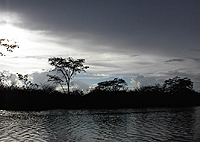
Cuyabeno river
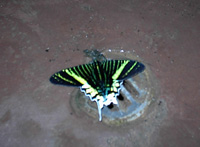
Amazon butterfly

One of many types of mushroom
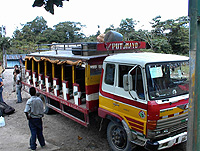
The devil mobile
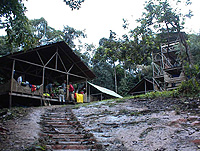
Biotravel lodge
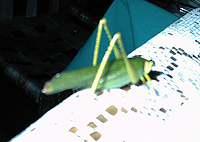
An uninvited guest
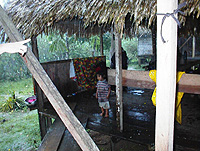
An Indian boy in the Shaman's hut

The shaman demontrated his craft
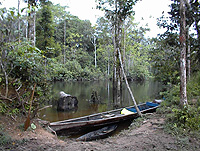
Our dugout canoe by a river bank
|
|
|
August 5, 2002
Swimming in the Amazon
My eggs didn’t seem to make it to the table and
I wondered if the waitress thought that I didn’t want it. After
an extended wait, they came in poached style. The waitress had asked
me how I wanted my eggs in Spanish. I uttered but she intervened
by rambling on a series of choices. I picked the easiest one that
I can repeat to her without any idea what it meant and awaited for a surprise.
It was 8:00am and after a 11 hrs. or so bus ride, sitting in Café
Aroma in Cayambe was alright for me.
Returning to the Andes from the Amazon was a change of scenery
indeed. Dry, barren land replaced the lush, thick, humid jungle.
Biological life diminished as I climbed higher. Another diminishing
matter was my energy. I was exhausted after the grueling 9 ½
hrs. bus ride from Lago Agrio, the gateway to the rainforest jungle, to Quito. The trip was extremely rocky
and bouncy.
The Putumayo bus line crossed mountains and rivers
overnight passing many obstacles to bring us back to civilization while I
was fighting the chill of the high altitude and attempted to sleep.
This bus was fashioned after an airplane. Above the two columns of
seats were the overhead bins. Reclining seats, beverage accommodation
and movie on board were some of the features on this ship. There was
a restroom in the back of the bus but you must asked for the key. The
driver cabin was separated from the passenger section.
They showed Air Force One starting Harrison Ford
onboard. It was an abysmal experience watching Ford speaking Spanish.
Though, they did a good job picking a voice actor to match Ford’s.
This bus has an attendant, a man in his 50s who wore a short sleeve shirt
and a red tie. He skirted the aisle bringing bottles of colas and
cookies to what appeared to be a fridge in the back of the bus. He
then proceed to pass out the cookies and the plastic cups to all the passengers.
Then the colas were poured from the bottles into the cups.
The man mastered the art of bracing himself while pouring
drinks without spilling on the customers as the bus bounced its way through
the rough road. After the passengers finished, he then returned and
collected all the cups. When he reached the very last row of seats,
he asked the passenger by the window to crack it open. She obediently
obeyed. At which time, he heaved all the used cups out the window.
The woman looked at me in disbelief. The bus winded its way through
the rough mountain road. I closed my eyes and thought about my time
in the Amazon jungle the last few days while the light dimmed.
The second attempt of the jungle adventure began
when I arrived at the Quito airport. The line at Tame airline counter
was substantial. And it wasn’t moving. I was there approximately
20 minutes before the flight starts. After about 15 minutes or so,
the clerk announced that the flight was sold out. Everyone frantically
scattered. Some oozed to the counter. I was puzzled and stupefied.
My agent has told me that he made the reservation change for me yesterday.
I walked up to the counter and asked one of the clerk about my situation.
He took my ticket and went at it on the computer then replied that I didn’t
have a reservation. I felt a little panic but I told him about the
confirmation my travel agent wrote in the front of the ticket. He
looked at it and then went at it again. After awhile, he processed
my case and commanded a baggage handler to rush me to the airplane.
After a 45 minutes flight to the jungle we landed in Lago Agrio,
an oil town on the fringe of the Amazon jungle. This place was the
heartland of the Cofan, a tribe that was isolated from civilization
until as late as the 50s. But in the 60s, Texaco found oil there.
And oil executives decided to name it Lago Agrio after another oil
mine in Texas called Sour Lake, over its ancient name of Nueva
Loja. Today, it is Dodge of Ecuador. One could
see gigantic oil refineries dotted among the land once belonged to the Indians
whose forest was taken over by the petroleros (oilers).
When we returned there after the jungle trip, a travel companion
of mine has her CD case ripped off right out of her bag. As she was
getting off the bus, a kid pretended to help her with her backpack while
another reached into her other bag. She yelled for help after she discovered
that her CDs were missing. We stopped the passengers from getting
off. At the same time, another kid was on the floor pretending to
be looking for something. She pointed at him as the culprit at which
time another passenger next to him reached down to his seat to deliver
me her CD case.
After gathering for my luggage in the airport, I
walked outside looking for an agent name Franklin. Franklin came up
and introduced me to our guide Isidrio. He asked me what company I
purchased my trip from. I told him it was Vasco Tours at which
point he told me that he is not taking anyone from Vasco tours. I
was stupefied again and trying to convince him that my agent has already
made the arrangement with the management. He marched away and I followed
suit.
At about the same time, a man in a white shirt came up to
him and said that my trip was confirmed and it was OK for me to join the
group. The man looked scrawny and unrefined. I didn’t know who
he was until later when I found out that he was the owner of the lodge which
I stayed. Mario was very attentive to his guest. A glance at him
would get his attention immediately.
We approached a big truck which has rows of wooden benches
customized in the back. There were no doors or windows protecting us
from the frying debris when it rambled down the gravel stone road. The
truck zoomed down on the narrow road passing other large vehicles in a neck
breaking speed. It honked its growling horn when overtaking other vehicles.
The proximity between these trucks were not more than inches.
At one point of the ride, our truck took out another heavy transporter’s
mirror. Its own mirror whacked the other guy’s into pieces as the
two collided. About 10 minutes later, the other truck driver emerged
and attempted to overtake ours. He honked and determined to pass.
Then he stopped and blocked the road. A whole line of vehicles were
forced to halt. The driver descended from the cabin and approached
ours. They exchanged while we were anxiously wonder what could happen
to us. After the negotiation ended, the other truck departed relieving
us from nervousness.
The road trip took more than 4 hrs. until we reached
the bank where the motor boats awaited us. This is the entrance
to the Cuyabeno Reserve. We got off the devil mobile and waited
for our motor craft to get ready. The trip through the river took
another 3 hrs. plus. Magnificent beauty of the Amazon river put me
at ease. I leaned back and enjoying the view while the roaring of
the motor mixing with the disturbed water delivered a much tranquil background
rhythm.
The ride took us to large laguna where the water opened up
to the sky. The sky, meanwhile, swirled by smeary cloud, reflected
back on the wavy water. While the water craft parted its way through the
laguna, I thought to myself; I’m in the middle of nowhere and it was the
most beautiful place I’d ever visited.
At a corner of the laguna was our lodging place. The
boat pulled into a landing bank with a flight of steps dug out of the muddy
shore and lined with branches. We strolled up to a structure with
a tin roof covering above. A row of hammocks slung across the wooden
posts. Two large tables occupied a large portion of the floor. A bar
separated the dinning area and the kitchen. In the back, the
kitchen which was enclosed was off limited to the patrons.
Isidrio told the group to wait while he arranged sleeping
quarters. He took me to a cabin which has 2 sets of bunk beds and
2 singles. He told me there are people sleeping there but by tomorrow,
they’d be gone. Isidrio put me in the top of a bunk and departed.
After we dropped off our bags, the group climbed back on the boat
and went out for a swim. We dropped anchor in the middle of the laguna.
Diving in the water, a refreshing coolness rushed through my skin. There
were pockets of cold and warm water intermingling in this pond. I floated
on my back looking up at the ambient sky. The sun was fixing to retreat
to its dormant position. Clouds colored themselves in vibrant colors.
Insects began their orchestra. And the current rafted in circle around
me. I felt at peace and relaxed. Swimming in the Amazon, was
it just a dream?
We climbed aboard our craft just as the sun began to sink.
Arrived back at camp we prepared for our first dinner in the jungle.
The table were lit with burning candles. An igloo of hot water positioned
in a corner for our refreshment. I parked myself in one of the lounging
hammocks waiting for the meal. Insects ringing and the soundscape
of the night provided the necessary mood for a jungle hunger.
When everyone arrived at the dining common, food began to
be brought out. We landed in our seats and began with the a meager
soup. It wasn’t no gourmet meal but anything would do for my growling
stomach. While we were attending to our meal a giant green grasshopper
came for a visit. Its presence drew oohs and aahs from the young travelers.
It also sparked conversations on the table. Minutes later, a huge hairy
spider joined in. This time a screech from a woman who sat to my left
greeted its arrival. The spider marched nonchalantly on the table
as if it would say: “Hey this is my territory, pay me some respect.”
And respect it got. Wherever it went, people grabbed their bowl of
food and lifted it off the table making way for the eight-legged creature.
The night drew even louder jungle soundscape. This sound
was therapeutic for an urban blues. Its harmony put me in a very
relaxing mood. Swinging in a hammock to the sound of insects and
night creatures slowly rafted me into a sleepy mode. But I then realized
I was in a position to be gravely assaulted by mosquitos.
Returning to the cabin, I climbed into my bunk. Noises
from the kitchen lingered across the field. The mildew smell of this
bed and the claustrophobic atmosphere of the mosquito net didn’t prevent
me from falling as sleep. But as I drifted into the curtain call of
my dream, a stream of light shone in my face stirred me up while the guy
who was holding the flashlight demanded that I get out of his bed.
I gathered my stuff and climbed down. Marching to the dinning common,
I looked for Isidrio. But he already went to bed. Mario then
attended to me. We went and searched for a new spot. We arrived
at a tall, erect structure three stories high. The lower part has some
covering around the walls. A bed with mosquito net dormantly waited
for my occupancy. Mario threw me a set of bed sheet and bid good night.
I fell into a most tranquil sleep since I’ve been to Ecuador.
A loud rumbling sound woke me up this morning.
When I opened my eyes, a wall of water fell around me. Rain poured
in great volume. I didn’t know where I was. I had to reorient myself.
I traced back my activities the last few days and the places I’ve been.
Then realized I woke up in the Amazon. The moisture in the air was
so thick, you can cut it with a machete. Half of my bed was soaked.
The clothing that I hung out to dry became wet rags.
Today’s program didn’t look very optimistic, I thought.
I looked around the camp. A couple of people darted through the
rain to get to the bathroom. Other than that, everyone else took
refuge in their own cabin. I wanted to climb back into my bed but
there was no point. Laying in a wet bed looking at the mosquito net
was not an ideal activity. So I pulled out my luggage and reorganized.
A jumbo size cockroach sprinted out from my bag. I quickly pulled out
each one of my garment and shook them like there is no tomorrow.
After going through half of them, I realized I’m in a jungle.
What was the point of keeping insects out of my stuff. I inspected
my camera equipments instead. They seemed to be taking on a beating.
The moisture certainly was not their friends as it crept deep into the crevices
and created chaos. Like how urgently it came, the rain retreated suddenly.
We filed into the dinning common for breakfast and headed
to the river. The aim was to reach a Siona-Secoya community,
the indigenous people who pretty much contaminated and infected by the spread
of western culture. The boat slowly moved along on the water surface
tracing its way to the jungle. I felt like Captain Willard
searching for General Kurtz. Noisy King Fishers yelped at our
presence. The trees and plants around us grew in such harmonious existence.
Their colors were so befitting and blending. Hardly any blemish was
apparent.
We approached an area of tall trees. Spider Monkeys
hopped from branch to branch. Not too far from there was a lounging
Anaconda more than ten feet long sunbathing on a fallen tree.
The hanging nests of Oropendula bird posed like exotic fruits dangling
from various trees. They shaped like a tennis ball dangled in a hanging
sock. I was told that these birds are master protector. They
often built fake nest to ward off predator. One can tell a real nest
by the presence of wasps nearby. The Oropendolas acquired insect
guardians by regularly building their nests beside those of wasps that hang
from trees like papery inverted mushrooms. Such wasps have very powerful
stings, certainly venomous and painful enough to deter any approaching predator.
After the wildlife viewing session, we reached an
open area with human dwellings. Indian huts on raised platforms
scattered among the land. We landed on a clearing with some modern
housing around. A man slept next to an upside down canoe with a full
setup from found materials. He nodded out underneath a plank
of wood hoisted by the canoe. Another block of wood was his pillow.
He was still wearing his rubber boots and western clothing. Drunk
from chicha one of the tourist exclaimed.
We walked through a soccer field to an empty school.
Peeking inside the cement floor room we saw some chairs, maps and charts
on the wall and a table but no desk. We hung out in this area for
awhile without really meeting anyone. There was a version of convenient
store at the end of the field where we saw a couple of local people.
I wondered what we do here? Are we here just to supply the dollar to the
local economy? Or because Isidrio ran out of activities and brought
us here to kill time. No one really cared about our presence.
Some people went out to the soccer field to kick a ball around.
Some other people purchased goods from the store.
We then moved on down the river. Next stop was the
Shaman’s house. We arrived at this mystic looking place with dead
trees laying in the water by a shore. Overgrown plants guarded a section
of the forest beyond a creek that was accessed by an old canoe placing on
both banks. The group gathered out by the river bank while waiting
for the star- The Shaman.
A man appeared in a long green tunic. His head donned a headband
with some feathers sticking out up top. Barefoot and all the man came
and greeted us. He brought with him a bowl of chicha. We each
took turn gulped down the pungent substance. The Shaman delivered
his short speech and then proceed to lead us on a tour of his garden.
Rain began to fall. We followed the barefoot man to different plants
as he explained their use. At one plant, he broke a leaf and grabbed
one of the participant’s arm and started smacking with the leaf.
The leaf is covered with these tiny sharp hair. And when it made contact
with your skin it stung slightly. Then your skin began to itch.
Few minutes later bumps appeared as if you had contracted a hive.
The situation seemed alarming and people complaint but the Shaman assured
us it was a medicinal practice.
It started to rain cats and dogs. My camera
was exposed and that was the last time it saw life. It rained so
hard we could hardly understand what the Shaman said or what was translated.
We abandoned the garden tour and headed for the hut. The wooden
structure and thatched roof was quiet accommodating for the jungle rain.
We refuged though lunch in this hut until the Shaman descended from the
upper level at which time we became spectators.
The Shaman changed his tunic to a blue one. His head
has transformed into a crown of feathers in bright color. Around
his neck were multiple neckwear in various forms of jungle resources- animal
tusks, shells, jungle seeds, etc. He came and sat down on a small
stool in the middle of the hut. A parrot feather speared his nose.
The Shaman picked a participant from the group for translation. He
proceed to relay his background in shamanism.
Starting from a young age he studied the craft under his father.
It is a family tradition as now two of his sons are following his footstep.
The man explained about the nature of the Yage- a concoction which yields
spiritual visions and also a magical potion for illnesses. He described
how the Yage has transcended him into the spiritual world where he floated
up into the sky above. He wore nothing but a reflective blue outfit.
There the shaman was able to attain the knowledge of the plants and their
medicinal purposes. These plants appeared to him in three
specific colors- Red, yellow and grey. Each color indicated a type
of cure that can be applied to the patience.
The shaman went on to explain about the intricate of shamanism
which consist of medicinal plant knowledge, witchcraft and spiritual vision.
After the spiel, he picked a volunteer to demonstrate a short version of
his healing practice. A young Belgian in the group stepped forward
and settled in front of the medicine man. The shaman chanted
a rhythmic verse and shook his fan, made from dried leaves, around the
volunteer’s body. It took approximately 30 seconds for the entire
process. By the time I get camera ready the procession was over.
Following his demonstration, the shaman requested $1 from
each of us. The move put some in a binding mood. We all looked
at each other in surprise. But no one appeared to reach into their
pocket. Some consulted another for how to handle the situation.
Then Isidrio came forward and began to man the collection. The Dutch
couple staged a protest as they paid only for the two adults arguing that
the shaman said he doesn’t charge children. Then the shaman’s wife
came down from upstair to bring us some arts and crafts for purchase.
The enterprising move left many people in a state of confusion.
Spirituality was preached as an ideology but commercialism was the practice.
This thought was hard to swallow as many including me felt it was a blatant
case of fraud. But then when I have the time to think it over, I felt
that it was just part of the modern dilemma they are facing. The Secoya
have been greatly reduced by the encroachment of Western development.
Their population is now in hundreds instead of thousands. They couldn’t
survive on Yage alone. And since their resources have been taken away,
the greenback is the next best thing. Either they learn to adapt or
die. And there is no subtle way to adapt changes except for being
forward.
We left the hut feeling down. The rain was completely
halted. We sloshed our way out of the Shaman’s joint. The long
ride back in the dugout canoe was very calm and peaceful. Night began
to fall. Bats skirted the water surface catching insects in hordes.
The air was wet and cool. My face caressed by the calm breeze.
I was so far from home but there was no other moment I can recall that was
more contend than that moment.
|
|